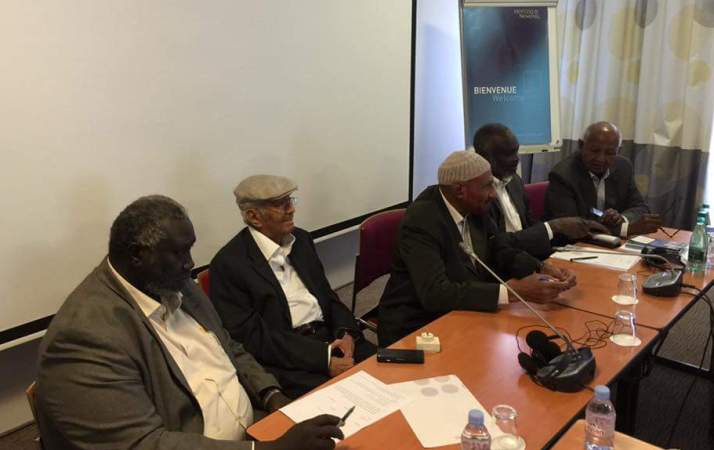Opposition “Sudan Call” reiterates rejection of Mbeki’s raodmap, approves structure
April 22, 2016 (KHARTOUM) – A meeting of the opposition alliance of the “Sudan Call” has rejected international pressures to sign the Roadmap Agreement proposed by the African Union mediation last March.

On Thursday, the “Sudan Call” forces concluded a four-day meeting in the French capital Paris in which it discussed its final structures and coordination with other opposition forces.
According to the final statement extended to Sudan Tribune on Thursday, the “Sudan Call” confirmed the unified stance of its members who refused to sign the Roadmap Agreement during the consultative meeting in Addis Ababa.
Last March, the Sudanese government signed a roadmap for peace in the country brokered by the African Union High Implementation Panel (AUHIP). But the “Sudan Call” groups rejected the plan.
Sudan Tribune has learnt that the representatives of the Sudan Troika including the United States, United Kingdom and Norway besides the European Union have exerted huge pressures on the leaders of the “Sudan Call” to sign the roadmap however the latter stood their ground.
According to reliable sources, the leaders of the “Sudan Call” forces didn’t succumb to the threats to impose sanctions on them if they refuse to join the roadmap.
The “Sudan Call” forces renewed its call for holding a serious and productive comprehensive national dialogue, accusing the AUHIP chair, Thabo Mbeki, of siding with the Sudanese government and circumventing recommendations of the AU Peace and Security Council (AUPSC) to hold a preparatory meeting to discuss the procedural matters of the dialogue.
The statement affirmed commitment to the comprehensive political solution that leads to a just and comprehensive peace and a full democratic transformation in the Sudan.
Also, the meeting agreed to coordinate with other opposition forces who seek change in order to achieve peace and democratic transformation besides mobilizing the masses to achieve a peaceful popular uprising to overthrow the regime.
The statement added that the leaders of the “Sudan Call” approved a political charter to restructure and rebuild the Sudanese state, pointing the charter determines the bases and principles that govern the four-year transitional period to achieve peace, security and democratic transformation in Sudan. The charter also details the tasks of the transitional government.
According to the statement, the “Sudan Call” approved an organizational structure including a presidential coordination council comprised of ten members who equally represent the five components of the alliance.
Also, the presidential council would form a secretariat and two executive offices inside Sudan and abroad to carry out its policies and decisions.
The final statement was signed by the NUP leader al-Sadiq al-Mahdi, the secretary general of the Sudanese Communist Party (SCP) Mohamed Mukhtar al-Khatib who signed on behalf of the National Consensus Forces (NCF) besides the representative of the civil society organizations Babiker Mohamed al-Hassan.
Also, the statement was signed by the leader of the Sudan People’s Liberation Movement/North (SPLM-N) Malik Agar and the leader of the Justice and Equality Movement (JEM) Gibril Ibrahim on behalf of his movement and the Sudan Liberation Movement (SLM) led by Minni Minnawi.
The “Sudan Call”, which was established in Addis Ababa on 3 December 2014, includes the NUP and rebel umbrella of Sudanese Revolutionary Front (SRF), the NCF and the Civil Society Initiative (CSI).
